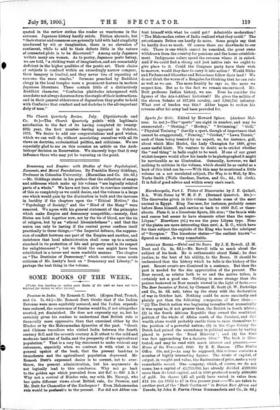SOME BOOKS OF THE WEEK.
[Under this heading we notice such Books of the week as have not been reserved for review in other forms.] Famines in India. By Romesh C. Dutt. (Began Paul, Trench, and Co. 7s. 6d.)—Mr. Romesh Dutt thinks that if the Indian Revenue were more equitably assessed, and the Indian expendi- ture reduced, the occurrence of famine would be, if not altogether averted, yet diminished. He does not expressly say so, but he certainly gives his readers to understand that British rule is financially more oppressive than that exercised either by the Hindoo or by the Mahoramedan dynasties of the past. "Greek and Chinese travellers who visited India between the fourth century B.C. and the seventh century A.D. attest to the mild and moderate land-tax of India, and the prosperity of the agricultural population." That is a very big statement to make without any references, especially when we contrast it with what is the general upshot of the book, that the present land-tax is immoderate and the agricultural population depressed. Mr. Romesh Dates expressed desire is to correct, not to over- throw, the present administration, but his arguments do not logically lead to this conclusion. Why not go back to the golden age which prevailed from 400 B.C. to 600 A.D. ? Why not a revival of Hindoo rule, say with Mr. Naoroji, who has quite different views about British rule, for Premier, and Mr. Dutt for Chancellor of the Exchequer? Even Mahommedan rule would be preferable to the present. For did not Akbar con- tent himself with what he could get? Admirable moderation ! "The Mahomedan rulers of India realised what they could." The extortionate Briton can hardly do more. Some people say that he hardly does so much. Of course there are drawbacks to our rule. There is one _which cannot be remedied, the great sums withdrawn from the country for pensions and the home establish- ment. Indigenous rulers spend the revenue where it is raised. And if we could find a strong and just native rule we ought to give place to it. Could the Congress party have their wish to.morrow, would they dare to carry it into action ? Would Sikhs and Pathans and Ghoorkas and Beloochees follow their lead ? We do not think the worse of a Bengalee for thinking that he can rule as well as we can. The more frankly he says so, the more we respect him. But as to the fact we remain unconvinced. Mr. Dutt professes Indian history, we see. Does he consider the figures of the Ain-i-Akbari historical ? He gives the militia of the eleven Subahs at 337,804 cavalry, and 3,946,705 infantry. What sort of burden was this ? Akbar began to reckon his revenue after his army had been provided for.


































 Previous page
Previous page